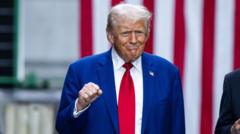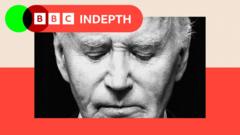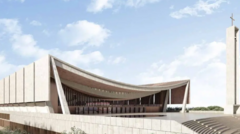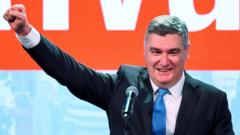Mahamudu Bawumia's journey from his early days to becoming a key political figure reflects both ambition and controversy as he vies for the presidency in a challenging political landscape.
**From Outsider to Presidential Contender: The Rise of Mahamudu Bawumia in Ghana**
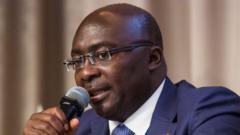
**From Outsider to Presidential Contender: The Rise of Mahamudu Bawumia in Ghana**
Ghana's vice-president is positioning himself for a historic presidential bid, potentially marking the country's first Muslim leader.
Mahamudu Bawumia has rapidly transitioned from being a political outsider to Ghana's vice-president and now aims to make history as the country's first Muslim head of state. As the official candidate for the New Patriotic Party (NPP) in the upcoming December elections, Bawumia has attracted significant attention for his technocratic approach and ambitious digital initiatives aimed at transforming Ghana's technological landscape.
Educated at Oxford University, Bawumia has earned the nickname "Mr Digital" for his commitment to advancing Ghana's digital economy. However, as the head of the country's economic management team, he faces backlash due to the current economic crisis, which has seen inflation soar to a staggering 54% and has required Ghana to solicit a $3 billion loan from the International Monetary Fund (IMF). Many Ghanaians express skepticism, questioning how Bawumia's credentials as an economist reconciled with the economic hardships they face.
Bawumia's political journey began in 2008 when NPP leader Nana Akufo-Addo chose him as a running mate. Despite losing the elections on multiple occasions, including a close defeat in 2012, his charisma and articulate defense of the party during a Supreme Court challenge garnered him respect. Eventually, in 2016, the NPP secured victory, leading to Bawumia's appointment as vice-president.
Born in Tamale as the 12th of 18 children, Bawumia's early life was dedicated to education, with his academic path marked by both hardships and achievements. His background in economics propelled him into significant roles, including serving as deputy governor of Ghana's central bank prior to his political ascent.
Bawumia's assertion of digital transformation in Ghana is met with mixed responses. While some laud the advancements in mobile connectivity and the establishment of a vaccine delivery network, critics argue that credit for these developments is inflated and that digital initiatives are merely a continuation of existing trends. In his campaign, he seeks to leverage both his technological vision and the strong support of his wife, Samira, who actively contributes to his political endeavors.
As Bawumia prepares for what could be a landmark election, his Muslim faith and northern roots may play crucial roles in shaping voter perception, with his party's support aimed at expanding influence in traditionally strong opposition areas. Yet, lingering doubts regarding his association with recent economic struggles may challenge his acceptance among voters, against the backdrop of an electrifying campaign spanning the nation.
With unwavering optimism, Bawumia maintains his belief in the potential of Ghana’s future, emphasizing the need for courage and resilience among citizens. His bid for presidency ignites aspirational hopes and questions about governance in a nation eager for change.
Educated at Oxford University, Bawumia has earned the nickname "Mr Digital" for his commitment to advancing Ghana's digital economy. However, as the head of the country's economic management team, he faces backlash due to the current economic crisis, which has seen inflation soar to a staggering 54% and has required Ghana to solicit a $3 billion loan from the International Monetary Fund (IMF). Many Ghanaians express skepticism, questioning how Bawumia's credentials as an economist reconciled with the economic hardships they face.
Bawumia's political journey began in 2008 when NPP leader Nana Akufo-Addo chose him as a running mate. Despite losing the elections on multiple occasions, including a close defeat in 2012, his charisma and articulate defense of the party during a Supreme Court challenge garnered him respect. Eventually, in 2016, the NPP secured victory, leading to Bawumia's appointment as vice-president.
Born in Tamale as the 12th of 18 children, Bawumia's early life was dedicated to education, with his academic path marked by both hardships and achievements. His background in economics propelled him into significant roles, including serving as deputy governor of Ghana's central bank prior to his political ascent.
Bawumia's assertion of digital transformation in Ghana is met with mixed responses. While some laud the advancements in mobile connectivity and the establishment of a vaccine delivery network, critics argue that credit for these developments is inflated and that digital initiatives are merely a continuation of existing trends. In his campaign, he seeks to leverage both his technological vision and the strong support of his wife, Samira, who actively contributes to his political endeavors.
As Bawumia prepares for what could be a landmark election, his Muslim faith and northern roots may play crucial roles in shaping voter perception, with his party's support aimed at expanding influence in traditionally strong opposition areas. Yet, lingering doubts regarding his association with recent economic struggles may challenge his acceptance among voters, against the backdrop of an electrifying campaign spanning the nation.
With unwavering optimism, Bawumia maintains his belief in the potential of Ghana’s future, emphasizing the need for courage and resilience among citizens. His bid for presidency ignites aspirational hopes and questions about governance in a nation eager for change.

